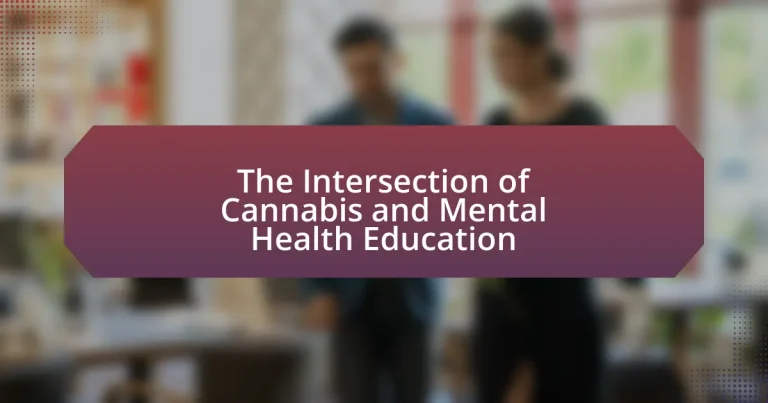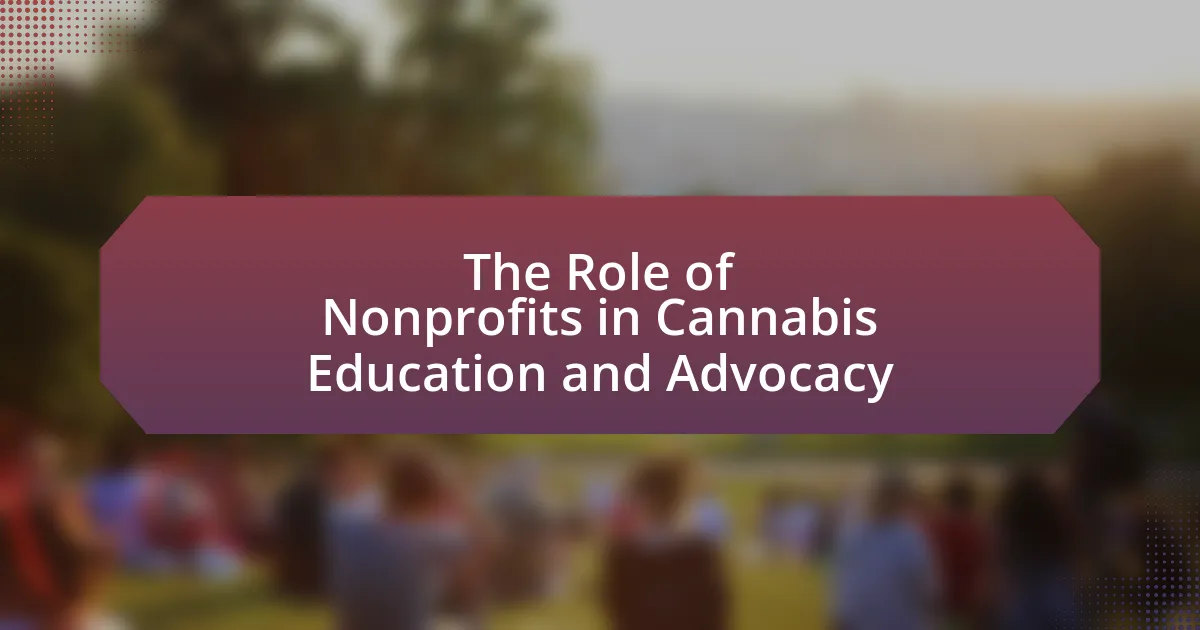The article examines the intersection of cannabis and mental health education, highlighting the dual nature of cannabis effects on mental health, including both potential therapeutic benefits and associated risks. It discusses how cannabis can alleviate symptoms of anxiety, depression, and PTSD while also posing risks such as increased anxiety and the potential for psychosis, particularly in predisposed individuals. The importance of mental health education is emphasized, as it equips individuals with knowledge to make informed decisions regarding cannabis use. Additionally, the article addresses current trends in education, the role of stigma, and the need for evidence-based resources to enhance understanding of cannabis’s impact on mental health.
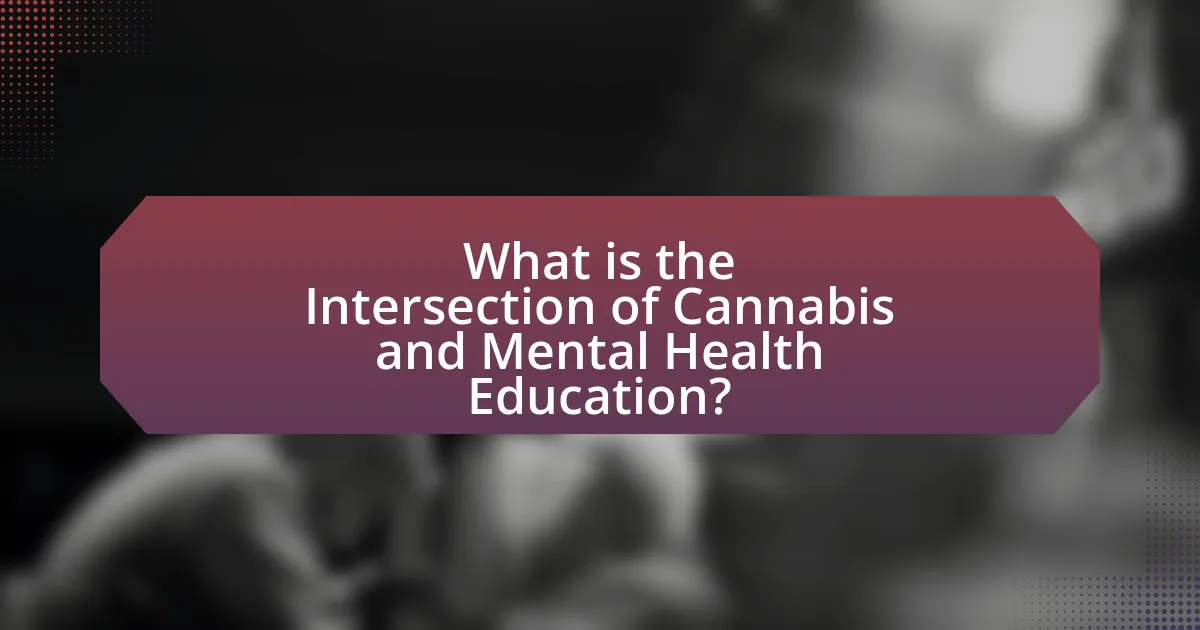
What is the Intersection of Cannabis and Mental Health Education?
The intersection of cannabis and mental health education involves understanding how cannabis use affects mental health and the importance of educating individuals about these effects. Research indicates that while some studies suggest cannabis may alleviate symptoms of anxiety and depression, other studies highlight potential risks, such as increased anxiety or the onset of psychosis in predisposed individuals. For instance, a study published in the journal “Psychological Medicine” found that high-potency cannabis is linked to a higher risk of psychotic disorders. Therefore, mental health education must encompass both the therapeutic potential and the risks associated with cannabis use to inform individuals effectively.
How does cannabis impact mental health?
Cannabis can have both positive and negative impacts on mental health. Research indicates that while some individuals may experience relief from symptoms of anxiety and depression through cannabis use, others may encounter increased anxiety, paranoia, or exacerbate existing mental health conditions. A study published in the journal “JAMA Psychiatry” found that high-THC cannabis strains are associated with a higher risk of psychosis, particularly in individuals with a predisposition to mental health disorders. Conversely, CBD, a non-psychoactive component of cannabis, has shown potential in reducing anxiety and improving mood in some clinical trials. Thus, the effects of cannabis on mental health are complex and can vary significantly based on individual factors, including genetic predisposition, the specific strain used, and the method of consumption.
What are the potential therapeutic benefits of cannabis for mental health conditions?
Cannabis has potential therapeutic benefits for mental health conditions, particularly in alleviating symptoms of anxiety, depression, and post-traumatic stress disorder (PTSD). Research indicates that cannabinoids, such as THC and CBD, can interact with the endocannabinoid system, which plays a role in regulating mood and stress responses. A study published in the Journal of Affective Disorders found that CBD significantly reduced anxiety in participants with social anxiety disorder, demonstrating its potential as a treatment option. Additionally, a review in the Journal of Psychopharmacology highlighted that cannabis use may lead to a reduction in PTSD symptoms, with some patients reporting improved sleep and decreased flashbacks. These findings suggest that cannabis may offer a complementary approach to traditional mental health treatments.
What risks are associated with cannabis use in relation to mental health?
Cannabis use is associated with several mental health risks, including increased anxiety, depression, and the potential for psychosis. Research indicates that individuals who use cannabis, particularly those who start at a young age or use high-potency strains, are at a greater risk for developing these mental health issues. A study published in the journal “Psychological Medicine” found that regular cannabis users are more likely to experience anxiety disorders and depressive symptoms compared to non-users. Additionally, the National Institute on Drug Abuse highlights that cannabis use can trigger psychotic episodes in predisposed individuals, particularly those with a family history of mental illness.
Why is mental health education important in the context of cannabis?
Mental health education is important in the context of cannabis because it equips individuals with knowledge about the potential mental health effects of cannabis use. Understanding how cannabis can influence mental health, including risks such as anxiety, depression, and psychosis, is crucial for informed decision-making. Research indicates that cannabis use can exacerbate existing mental health conditions and may lead to the development of new issues, particularly in vulnerable populations. For instance, a study published in the journal “Psychological Medicine” found that cannabis use is associated with an increased risk of developing psychotic disorders, especially among those with a family history of such conditions. Therefore, mental health education serves as a vital tool in promoting safe cannabis use and mitigating its potential negative impacts on mental well-being.
How can education improve understanding of cannabis effects on mental health?
Education can improve understanding of cannabis effects on mental health by providing evidence-based information that clarifies the complex relationship between cannabis use and mental health outcomes. Comprehensive educational programs can address misconceptions, highlight research findings, and present data on both the therapeutic benefits and potential risks associated with cannabis consumption. For instance, studies have shown that while cannabis may alleviate symptoms of certain mental health disorders, such as anxiety and PTSD, it can also exacerbate conditions like schizophrenia and lead to dependency issues. By disseminating accurate information through workshops, seminars, and online resources, education empowers individuals to make informed decisions regarding cannabis use and its implications for mental health.
What role does stigma play in cannabis and mental health education?
Stigma significantly hinders cannabis and mental health education by perpetuating misinformation and discouraging open dialogue. This stigma often leads to negative perceptions of individuals who use cannabis for therapeutic purposes, which can prevent them from seeking help or discussing their mental health needs. Research indicates that stigma surrounding cannabis use is linked to broader societal attitudes towards mental health, where individuals may fear judgment or discrimination, thus limiting their access to accurate information and support. For instance, a study published in the journal “Psychological Medicine” found that stigma can exacerbate mental health issues by isolating individuals and reducing their willingness to engage in treatment options that include cannabis.
What are the current trends in cannabis and mental health education?
Current trends in cannabis and mental health education include an increasing focus on evidence-based research, integration of cannabis into therapeutic practices, and the development of educational programs aimed at healthcare professionals and the public. Research indicates that cannabis may have therapeutic benefits for conditions such as anxiety and PTSD, prompting educational initiatives that emphasize understanding its effects and potential risks. For instance, a study published in the Journal of Psychoactive Drugs highlights the importance of educating clinicians about cannabis to improve patient care and safety. Additionally, universities and organizations are offering courses that cover the pharmacology of cannabis and its implications for mental health, reflecting a growing recognition of its relevance in mental health discussions.
How are educational programs addressing cannabis use and mental health?
Educational programs are addressing cannabis use and mental health by providing evidence-based information on the effects of cannabis on mental health, promoting awareness of potential risks, and offering strategies for responsible use. These programs often include curricula that cover the relationship between cannabis and mental health disorders, such as anxiety and depression, highlighting research findings that indicate increased risks for individuals with pre-existing mental health conditions. For instance, studies have shown that cannabis use can exacerbate symptoms in individuals with schizophrenia, which educational programs emphasize to inform students and communities. Additionally, programs may incorporate harm reduction strategies, teaching individuals how to make informed decisions regarding cannabis use while considering their mental health.
What resources are available for learning about cannabis and mental health?
Resources for learning about cannabis and mental health include academic journals, online courses, and reputable websites. Academic journals such as “The Journal of Psychoactive Drugs” and “Cannabis and Cannabinoid Research” publish peer-reviewed studies that explore the effects of cannabis on mental health conditions. Online platforms like Coursera and edX offer courses on cannabis science and its implications for mental health, often created by universities or experts in the field. Additionally, websites like the National Institute on Drug Abuse and the American Psychological Association provide evidence-based information and research findings on the relationship between cannabis use and mental health outcomes.
How can we bridge the gap between cannabis research and mental health education?
To bridge the gap between cannabis research and mental health education, it is essential to integrate evidence-based findings from cannabis studies into educational curricula for mental health professionals. This integration can be achieved by developing training programs that include the latest research on the effects of cannabis on mental health, such as studies indicating that certain cannabinoids may alleviate symptoms of anxiety and depression. For instance, a 2020 study published in the Journal of Affective Disorders found that CBD may reduce anxiety in individuals with social anxiety disorder, highlighting the need for mental health education to encompass emerging cannabis research. By fostering collaboration between researchers and educators, mental health professionals can be better equipped to understand and communicate the potential benefits and risks of cannabis use in therapeutic settings.
What challenges exist in integrating cannabis education into mental health curricula?
Integrating cannabis education into mental health curricula faces several challenges, primarily due to stigma, lack of standardized information, and regulatory barriers. Stigma surrounding cannabis use often leads to resistance from educators and institutions, hindering the acceptance of cannabis as a legitimate topic in mental health discussions. Additionally, the absence of standardized, evidence-based curricula on cannabis complicates the integration process, as educators may struggle to find reliable resources. Regulatory barriers also pose significant challenges, as varying state laws regarding cannabis can create confusion and limit the ability to teach about its effects and therapeutic potential in a consistent manner. These factors collectively impede the effective incorporation of cannabis education into mental health training programs.
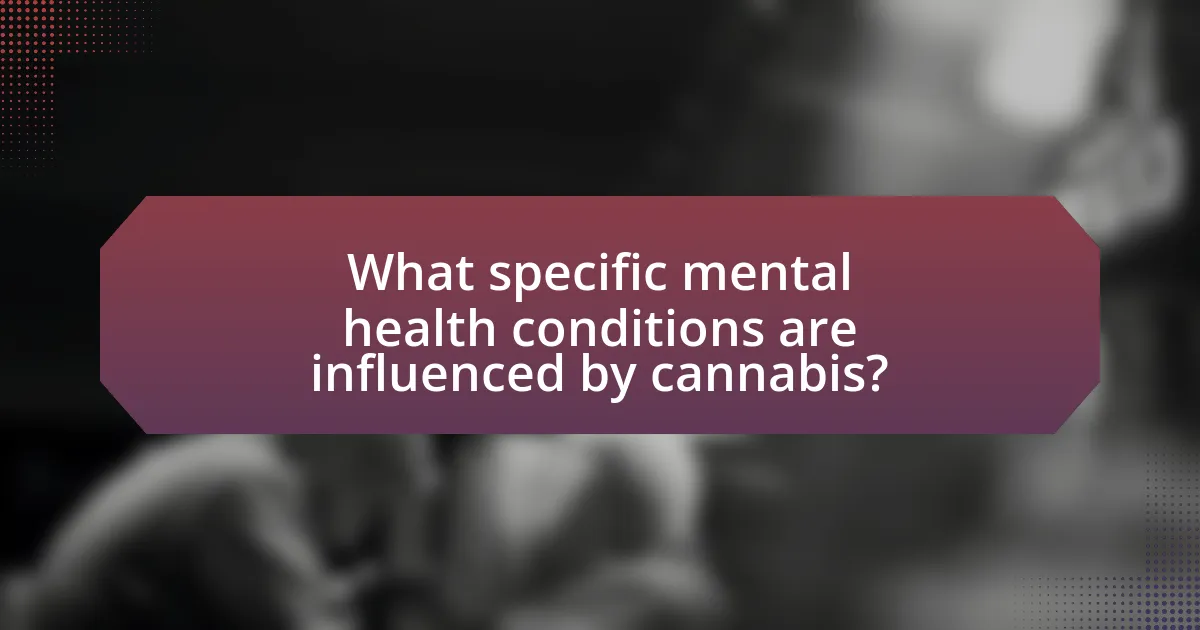
What specific mental health conditions are influenced by cannabis?
Cannabis influences several specific mental health conditions, including anxiety disorders, depression, and post-traumatic stress disorder (PTSD). Research indicates that cannabinoids, the active compounds in cannabis, can modulate anxiety levels; for instance, a study published in the Journal of Psychopharmacology found that CBD, a cannabinoid, may reduce anxiety in individuals with social anxiety disorder. Additionally, cannabis has been reported to alleviate symptoms of depression in some users, although its effects can vary widely. A review in the journal Frontiers in Psychiatry highlighted that while some individuals experience relief from depressive symptoms, others may find that cannabis exacerbates their condition. Furthermore, cannabis is often used by individuals with PTSD to manage symptoms such as intrusive thoughts and hyperarousal, as noted in a study published in the Journal of Psychoactive Drugs, which found that cannabis use was associated with a reduction in PTSD symptoms.
How does cannabis affect anxiety disorders?
Cannabis can both alleviate and exacerbate anxiety disorders, depending on various factors such as dosage, strain, and individual response. Research indicates that lower doses of cannabis, particularly those high in cannabidiol (CBD), may reduce anxiety symptoms by interacting with serotonin receptors in the brain. For instance, a study published in the Journal of Psychopharmacology found that CBD significantly reduced anxiety in participants with social anxiety disorder during public speaking tasks. Conversely, higher doses or strains high in tetrahydrocannabinol (THC) can increase anxiety and paranoia in some users, as evidenced by findings in the journal Neuropsychopharmacology, which reported that THC can induce anxiety in susceptible individuals. Thus, the effects of cannabis on anxiety disorders are complex and vary widely among users.
What evidence supports the use of cannabis for anxiety relief?
Cannabis has been shown to provide anxiety relief through various studies and clinical trials. Research published in the Journal of Affective Disorders in 2019 indicated that cannabidiol (CBD), a non-psychoactive component of cannabis, significantly reduced anxiety in participants with social anxiety disorder during public speaking tasks. Additionally, a meta-analysis in 2020 in the journal Neurotherapeutics reviewed multiple studies and concluded that cannabinoids, particularly CBD, have anxiolytic effects, supporting their use in treating anxiety disorders. These findings suggest that cannabis, specifically CBD, can be an effective option for anxiety relief based on empirical evidence.
What are the potential drawbacks of using cannabis for anxiety management?
Using cannabis for anxiety management can lead to several potential drawbacks, including increased anxiety, dependency, and cognitive impairment. Research indicates that while some individuals may experience temporary relief from anxiety symptoms, others may find that cannabis exacerbates their anxiety, particularly with high-THC strains. A study published in the Journal of Affective Disorders found that regular cannabis use can lead to increased anxiety and depression in some users. Additionally, cannabis can create a risk of dependency, with the National Institute on Drug Abuse noting that about 9% of users may develop a cannabis use disorder. Cognitive impairment is another concern, as studies have shown that cannabis can affect memory, attention, and decision-making abilities, which may hinder overall mental health management.
What is the relationship between cannabis and depression?
Cannabis has a complex relationship with depression, as it can both alleviate and exacerbate symptoms depending on various factors. Some studies indicate that certain cannabinoids, particularly cannabidiol (CBD), may have antidepressant effects and can reduce anxiety, potentially benefiting individuals with depression. For instance, a review published in the journal “Frontiers in Psychology” in 2018 found that CBD showed promise in reducing anxiety and depression in preclinical studies. However, other research suggests that high THC levels can lead to increased anxiety and depressive symptoms in some users, particularly in those predisposed to mental health issues. A study in “JAMA Psychiatry” in 2016 highlighted that frequent cannabis use was associated with a higher risk of developing depression and anxiety disorders. Thus, the relationship between cannabis and depression is influenced by the type of cannabinoids, dosage, individual predispositions, and the context of use.
How can cannabis use impact depressive symptoms?
Cannabis use can both alleviate and exacerbate depressive symptoms, depending on various factors such as dosage, individual biology, and the specific strain used. Research indicates that certain cannabinoids, particularly cannabidiol (CBD), may have antidepressant effects by interacting with serotonin receptors, which can improve mood and reduce anxiety. For instance, a study published in the Journal of Psychopharmacology found that CBD administration led to significant reductions in anxiety and depressive behaviors in animal models, suggesting potential therapeutic benefits for humans. Conversely, high doses of tetrahydrocannabinol (THC) can lead to increased anxiety and depressive symptoms in some users, particularly in those predisposed to mental health issues. Therefore, the impact of cannabis on depressive symptoms is complex and varies widely among individuals.
What are the considerations for using cannabis as a treatment for depression?
Using cannabis as a treatment for depression requires careful consideration of its potential benefits and risks. Research indicates that cannabinoids, particularly CBD, may alleviate symptoms of depression by interacting with serotonin receptors in the brain. However, the psychoactive component THC can exacerbate anxiety and lead to dependency in some individuals, complicating its use as a treatment.
Additionally, the variability in cannabis strains and individual responses necessitates personalized approaches to treatment. A study published in the Journal of Affective Disorders found that while some patients reported improved mood and reduced anxiety, others experienced adverse effects, highlighting the importance of medical supervision. Furthermore, legal status and quality control of cannabis products can impact treatment efficacy and safety.
In summary, while cannabis may offer therapeutic benefits for depression, it is essential to weigh these against potential risks and to consider individual patient factors and legal implications.
How does cannabis interact with PTSD?
Cannabis interacts with PTSD by potentially alleviating symptoms such as anxiety, insomnia, and flashbacks. Research indicates that cannabinoids, particularly THC and CBD, may modulate the endocannabinoid system, which plays a role in stress response and emotional regulation. A study published in the Journal of Psychopharmacology found that participants with PTSD reported reduced symptoms after using cannabis, suggesting its efficacy in symptom management. Additionally, a review in the Journal of Clinical Psychology highlighted that cannabis may help improve sleep quality and reduce nightmares in PTSD patients, further supporting its therapeutic potential.
What research exists on cannabis as a treatment for PTSD symptoms?
Research indicates that cannabis may alleviate PTSD symptoms, with several studies supporting its potential efficacy. A notable study published in the Journal of Psychopharmacology in 2019 by Wilsey et al. found that patients with PTSD experienced significant reductions in symptoms after using cannabis. Additionally, a 2020 review in the Journal of Clinical Psychology by ElSohly et al. highlighted that cannabinoids, particularly CBD, may help reduce anxiety and improve sleep, which are common issues in PTSD. Furthermore, a 2021 study in the Journal of Affective Disorders by Haller et al. reported that cannabis use was associated with lower PTSD symptom severity among veterans. These findings collectively suggest that cannabis could be a viable treatment option for managing PTSD symptoms, although further research is necessary to establish definitive conclusions.
What are the risks of using cannabis for individuals with PTSD?
Using cannabis for individuals with PTSD carries several risks, including potential exacerbation of symptoms, dependency issues, and impaired cognitive function. Research indicates that while some individuals may experience temporary relief from anxiety or intrusive thoughts, cannabis can also lead to increased paranoia and anxiety in others, particularly with high-THC strains. A study published in the Journal of Psychopharmacology found that cannabis use can impair memory and attention, which may hinder the effectiveness of therapeutic interventions for PTSD. Additionally, the risk of developing a cannabis use disorder is significant, with estimates suggesting that approximately 9% of users may become dependent, a figure that rises with increased frequency of use. These factors highlight the need for caution and further research regarding cannabis use in individuals with PTSD.
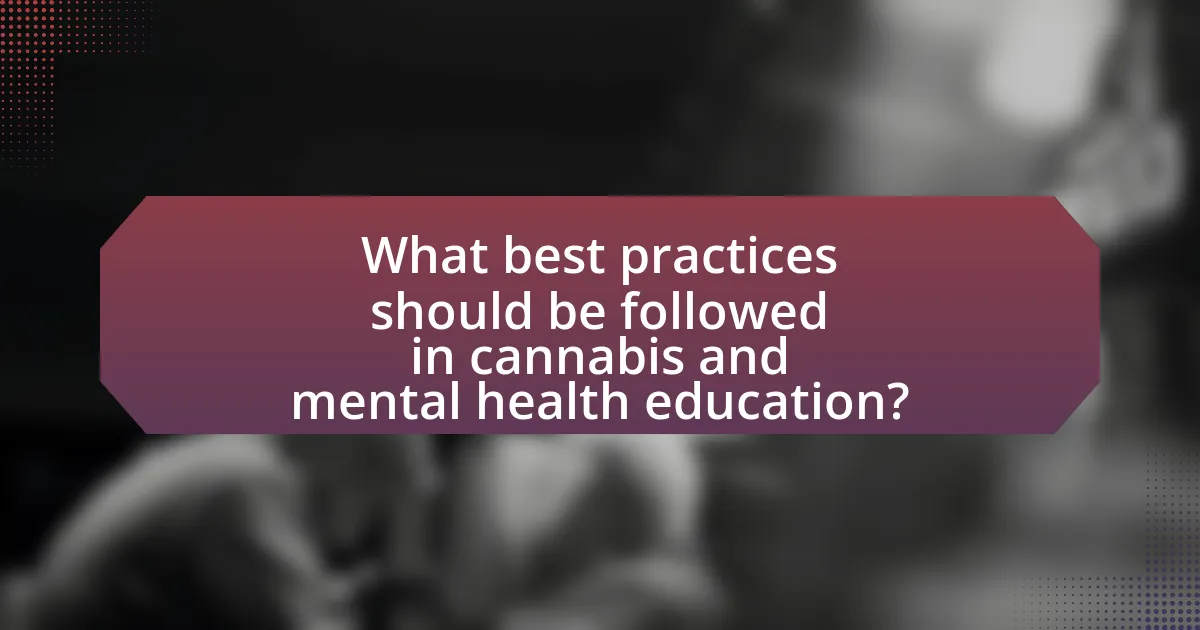
What best practices should be followed in cannabis and mental health education?
Best practices in cannabis and mental health education include providing evidence-based information, ensuring cultural competence, and promoting open dialogue. Evidence-based information is crucial as it helps individuals understand the effects of cannabis on mental health, supported by research such as the study published in JAMA Psychiatry, which found that cannabis use can exacerbate symptoms in individuals with pre-existing mental health conditions. Cultural competence ensures that educators respect and understand diverse backgrounds, which is essential for effective communication and engagement. Promoting open dialogue encourages individuals to share their experiences and concerns, fostering a supportive environment for learning. These practices collectively enhance the effectiveness of cannabis and mental health education.
How can educators effectively teach about cannabis and mental health?
Educators can effectively teach about cannabis and mental health by integrating evidence-based research into their curriculum. This approach ensures that students receive accurate information regarding the effects of cannabis on mental health, including both potential therapeutic benefits and risks. For instance, studies have shown that while cannabis may alleviate symptoms of anxiety and depression in some individuals, it can also exacerbate conditions like schizophrenia and lead to increased anxiety in others. By utilizing resources such as the National Institute on Drug Abuse, which provides comprehensive data on cannabis and mental health, educators can present a balanced view. Additionally, incorporating interactive discussions and real-life case studies can enhance understanding and engagement among students, fostering critical thinking about the complexities of cannabis use and its mental health implications.
What strategies can be employed to create engaging educational content?
To create engaging educational content, utilize interactive elements such as quizzes, videos, and discussion forums. These strategies enhance learner participation and retention by actively involving them in the learning process. Research indicates that interactive content can increase engagement rates by up to 70%, as it encourages learners to apply knowledge in real-time scenarios. Additionally, incorporating storytelling techniques can make complex topics, like the intersection of cannabis and mental health, more relatable and memorable, as narratives help contextualize information and foster emotional connections.
How can educators address misconceptions about cannabis in mental health?
Educators can address misconceptions about cannabis in mental health by providing evidence-based information and fostering open discussions. Research indicates that cannabis can have both therapeutic and adverse effects on mental health, depending on factors such as dosage, frequency of use, and individual predispositions. For instance, a study published in the journal “Psychological Medicine” found that while cannabis may alleviate symptoms of anxiety and depression for some individuals, it can also exacerbate these conditions in others, particularly among those with a history of mental illness. By integrating such findings into their curriculum, educators can clarify the complexities surrounding cannabis use and mental health, thereby dispelling myths and promoting informed decision-making among students.
What resources are available for individuals seeking information on cannabis and mental health?
Individuals seeking information on cannabis and mental health can access various resources, including academic journals, government health websites, and nonprofit organizations. Academic journals such as “The Journal of Psychoactive Drugs” and “Cannabis and Cannabinoid Research” publish peer-reviewed studies that explore the effects of cannabis on mental health conditions. Government health websites like the National Institute on Drug Abuse provide evidence-based information on cannabis use and its psychological impacts. Nonprofit organizations, such as the American Psychological Association, offer educational materials and resources that address the relationship between cannabis and mental health. These resources collectively provide a comprehensive understanding of the topic, supported by scientific research and expert insights.
Where can individuals find credible research and data on cannabis effects?
Individuals can find credible research and data on cannabis effects through reputable academic journals, government health agencies, and established medical organizations. For instance, the National Institute on Drug Abuse (NIDA) provides comprehensive information and research findings on cannabis and its effects on health. Additionally, peer-reviewed journals such as “The Journal of Cannabis Research” and “Cannabis and Cannabinoid Research” publish studies that explore various aspects of cannabis use and its impact on mental health. These sources are recognized for their scientific rigor and reliability, ensuring that the information is accurate and up-to-date.
What support networks exist for those exploring cannabis for mental health?
Support networks for those exploring cannabis for mental health include organizations such as the National Organization for the Reform of Marijuana Laws (NORML), which advocates for cannabis policy reform and provides resources for individuals seeking information on cannabis use for mental health. Additionally, the Cannabis Health Network offers educational resources and community support for individuals interested in the therapeutic benefits of cannabis. Research indicates that peer support groups, both online and in-person, can also serve as valuable networks for sharing experiences and information related to cannabis and mental health. These networks facilitate access to shared knowledge and personal stories, enhancing understanding and support for individuals navigating this intersection.
What are the key takeaways for individuals interested in cannabis and mental health education?
Key takeaways for individuals interested in cannabis and mental health education include understanding the potential therapeutic benefits of cannabis for mental health conditions, recognizing the importance of dosage and strain selection, and being aware of the legal and social implications surrounding cannabis use. Research indicates that cannabinoids, particularly CBD, may alleviate symptoms of anxiety and depression, as evidenced by a study published in the Journal of Psychopharmacology, which found that CBD reduced anxiety in participants during public speaking tasks. Additionally, individuals should consider the varying effects of different cannabis strains, as some may exacerbate symptoms while others provide relief. Lastly, staying informed about local laws and societal attitudes towards cannabis is crucial for responsible use and education.
